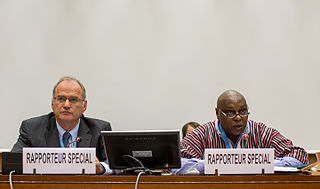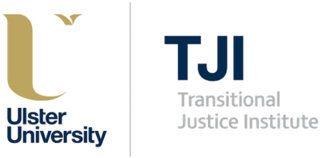Related Research Articles

Special rapporteur is the title given to independent human rights experts whose expertise is called upon by the United Nations (UN) to report or advise on human rights from a thematic or country-specific perspective.

A truth commission, also known as a truth and reconciliation commission or truth and justice commission, is an official body tasked with discovering and revealing past wrongdoing by a government, in the hope of resolving conflict left over from the past. Truth commissions are, under various names, occasionally set up by states emerging from periods of internal unrest, civil war, or dictatorship marked by human rights abuses. In both their truth-seeking and reconciling functions, truth commissions have political implications: they "constantly make choices when they define such basic objectives as truth, reconciliation, justice, memory, reparation, and recognition, and decide how these objectives should be met and whose needs should be served".

Juan E. Méndez is an Argentine lawyer, former United Nations Special Rapporteur on Torture and Other Cruel, Inhuman or Degrading Treatment or Punishment, and a human rights activist known for his work on behalf of political prisoners.

The Equity and Reconciliation Commission was a Moroccan truth and reconciliation commission active under a two-year mandate from 2004 to 2005 focusing on human rights abuses committed during the Years of Lead mainly under King Hassan II's rule.
Transitional justice is a process which responds to human rights violations through judicial redress, political reforms and cultural healing efforts in a region or country, and other measures in order to prevent the recurrence of human rights abuse. Transitional justice consists of judicial and non-judicial measures implemented in order to redress legacies of human rights abuses. Such mechanisms "include criminal prosecutions, truth commissions, reparations programs, and various kinds of institutional reforms" as well as memorials, apologies, and various art forms. Transitional justice is instituted at a point of political transition classically from war to positive peace, or more broadly from violence and repression to societal stability and it is informed by a society's desire to rebuild social trust, reestablish what is right from what is wrong, repair a fractured justice system, and build a democratic system of governance. Given different contexts and implementation the ability to achieve these outcomes varies. The core value of transitional justice is the very notion of justice—which does not necessarily mean criminal justice. This notion and the political transformation, such as regime change or transition from conflict are thus linked to a more peaceful, certain, and democratic future.
The International Center for Transitional Justice (ICTJ) was founded in 2001 as a non-profit organization dedicated to pursuing accountability for mass atrocity and human rights abuse through transitional justice mechanisms.

Diego García-Sayán Larrabure is a Peruvian lawyer and former Foreign Affairs Minister of Perú. He sat as judge of the Inter-American Court of Human Rights, and was president of the Court between 2010 and 2012. He was the United Nations Special Rapporteur on the independence of judges and lawyers.
Chris Mahony is a former rugby union player for the Auckland Air New Zealand Cup team, playing fullback centre or wing. He played for Oxford University where he has completed a Masters in African Studies and a DPhil in Politics.
Truth-seeking processes allow societies to examine and come to grips with past crimes and atrocities and prevent their future repetition. Truth-seeking often occurs in societies emerging from a period of prolonged conflict or authoritarian rule. The most famous example to date is the South African Truth and Reconciliation Commission, although many other examples also exist. Most commonly these are carried out by official truth and reconciliation commissions as a form of restorative justice, but there are other mechanisms as well.
Reparations are broadly understood as compensation given for an abuse or injury. The colloquial meaning of reparations has changed substantively over the last century. In the early 1900s, reparations were interstate exchanges that were punitive mechanisms determined by treaty and paid by the surrendering side of a conflict, such as the World War I reparations paid by Germany and its allies. Reparations are now understood as not only war damages but also compensation and other measures provided to victims of severe human rights violations by the parties responsible. The right of the victim of an injury to receive reparations and the duty of the part responsible to provide them has been secured by the United Nations.
Memorialization generally refers to the process of preserving memories of people or events. It can be a form of address or petition, or a ceremony of remembrance or commemoration.

In Brazil, the National Truth Commission investigated human rights violations of the period of 1946–1988 - in particular by the authoritarian military dictatorship that ruled Brazil from April 1, 1964 to March 15, 1985.

The United Nations Special Rapporteur on the promotion of truth, justice, reparation and guarantees of non-recurrence works independently to inform and advise the United Nations Human Rights Council on the promotion of human rights-compliant approaches to transitional justice.
Colombia has been in the throes of civil unrest for over half a century. Between 1964 and now, 3 million persons have been displaced and about 220,000 have died, 4 out of 5 deaths were non-combatant civilians. Between left and right-winged armed forces, paramilitary and/or guerrilla, and an often corrupt government, it has been difficult for Colombia to set up any kind of truth or reconciliation commission. That is why the first on the scene, so to speak, were representatives of the UN. The Office of the United Nations High Commissioner for Human Rights has been present in Colombia since 1997. Since 2006 though, there has been another international movement turning its attention to Colombia; namely the International Center for Transitional Justice (ICTJ). The works of both of these institutions have led to a few semi-official national committees to oversee truth seeking missions in the hopes of eventually achieving reparation. In 2012, the Colombian government and the Revolutionary Armed Forces of Colombia (FARC) began their fourth attempt to negotiate an end to the fighting. Peace talks between the Colombian government of Juan Manuel Santos and the FARC, the main guerrilla force in the country, are currently underway in Havana, Cuba. The main issues are land redistribution, integration of the FARC into the political arena and an end to the powerful cocaine cartels. Though past attempts at peace talks have failed, negotiators in Havana, Cuba have gotten significantly further than ever before. Experts agree that it is not unreasonable to expect an accord by the end of 2014. In the words of President Santos: "Only in a Colombia without fear and with truth can we begin to turn the page."

The Ulster University's Transitional Justice Institute (TJI), is a law-led multidisciplinary research institute of Ulster University which is physically located at the Jordanstown, and Magee campuses. It was created in 2003, making it the first and longest-established university research centre on this theme. In the 2014 Research Excellence Framework (REF) Law at Ulster University was ranked 4th overall in the UK. Ulster was ranked first for impact in law with 100% of impact rated as world-leading, the only University to achieve this in law.

Rashida Manjoo is an Emeritus Professor at the University of Cape Town in Cape Town and a social activist involved in the eradication of violence against women and gender-based violence. Manjoo was the United Nations' Special Rapporteur on Violence Against Women from June 2009 to July 2015.

Yanghee Lee is a South Korean developmental psychologist and professor at Sungkyunkwan University. She is most noted for her work in international human rights organisations. Lee is highly recognized nationally, regionally, and internationally for her expertise in human rights. She has published numerous articles and books on human rights and children’s rights.
The Commission of Inquiry to Locate the Persons Disappeared during the Panchayat Period (1990–1991) is a truth commission established in Nepal in 1990 after the end of the autocratic Panchayat Regime by the first post-Panchayat Prime Minister Krishna Prasad Bhattharai. The commission was set up to examine allegations of human rights violations and inquire about enforced disappearances during the Panchayat system from 1961 to 1990. A report was officially submitted to the government in 1991, but it was made public only in 1994. The commission identified 35 persons disappeared on about one hundred studied cases. However, no alleged perpetrators were judged.

Peru's Truth and Reconciliation Commission was a truth and reconciliation commission established by President Alejandro Toledo to investigate the human rights abuses committed during the internal conflict in Peru between 1980s and 1990s. The TRC was a response to the violent internal conflict between 1980 and 2000 during the administration of Presidents Fernando Belaúnde (1980–1985), Alan García (1985–1990), and Alberto Fujimori (1990–2000). The commission's mandate was to provide a record of human rights and international humanitarian law violations committed in Peru between May 1980 and November 2000, as well as recommend mechanisms to promote and strengthen human rights. The TRC reported on the estimated 70 000 deaths, assassinations, torture, disappearances, displacement, employment of terrorist methods and other human rights violations executed by the State, Shining Path, and the Túpac Amaru Revolutionary Movement. The report concluded that there is both institutional and individual accountability, as well as identifying racial and cultural factors that became a catalyst for conflict.
References
- 1 2 3 "Application for appointment as Special Rapporteur".
- 1 2 "Biography on ICTJ website". Archived from the original on 2012-05-10.
- ↑ "Human Rights Council resolution 18/7 of 29 September 2011".
- ↑ "OHCHR list of candidates for SR appointments, 2012". Archived from the original on 2012-03-26.
- ↑ "SR shortlisting announcement" (PDF).
- ↑ "ICTJ Congratulates Pablo de Greiff on Nomination for Special Rapporteur on Transitional Justice - ICTJ". 22 March 2012.
- ↑ "Awarded Grants, Open Society Foundations".
- ↑ Advisory Board International Center for Transitional Justice (ICTJ).
- ↑ Pablo de Greiff Archived 2018-10-23 at the Wayback Machine Open Society Foundations (OSF).